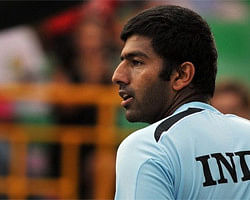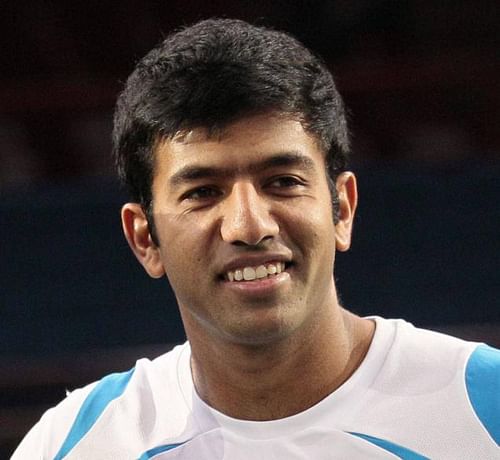
Interview with Rohan Bopanna: "Tennis can sometimes get really lonely as a sport"

Rohan Bopanna
Second seeds Rohan Bopanna and Aisam-ul-Haq Qureshi let a comfortable second-set lead slip away from their fingers before they finally closed the match out on their fourth match point in the Dubai first round.
The Indo-Pak express raced to a 5-0 start in just 16 minutes, breaking both their opponents’ serve twice. They were in full command till the sixth game of the second set. Davydenko and Hanescu, who battled through the qualifying rounds, eventually found their rhythm to break the Bangalorean’s serve.
The next few games saw multiple chances for both teams fly past them, with almost all of them extending till deuce. A poor service game by Qureshi at 5-6 ensured that the match went to the deciding super tie-breaker.
The super tie-break encapsulated the essence of the match, as after the exchange of a few mini-breaks, Bopanna and Qureshi dominated their way to a 9-5 lead. The pair needed four match points and Bopanna finally sealed the win with a well-placed serve. I had the chance to catch up with Rohan Bopanna post the match and here are excerpts from the interview:
Q. After cruising in the first set, you were leading in the second set by 3-1, and also had a big lead in the super tie-break. Why do you think you had difficulty closing out the match today?
Bopanna: Guys like Davydenko and Hanescu are great singles players, so they put a lot of pressure while returning serve. With this new format and the no-advantage point, we had a few chances to break and they played a couple of good points. In a way, yes, in the super tie-break we definitely should have closed the match a few points earlier. But it’s always good to come through such matches, especially in the first round. Those guys have already played two matches since they came through qualifying, and were used to the conditions. We are just happy we still pulled it out, it could have been so much worse had we lost after leading.
Q. There were so many games in the second set that went to deuce. In the current doubles format, which has the no-ad rule and the super tie-break, how important a role does luck play?
Bopanna: Well, this format has been in place for a few years and we have gotten used to it. Pretty much every match goes that close. I wouldn’t say that luck is not needed. Especially in the super tie-break, a bit of luck helps. I remember, they had a point which hit the frame and they lost the point, and then I had a let cord which we eventually lost. So it all evened out in the end.
Q. Your next match may potentially be against Mahesh Bhupathi. Is it difficult playing against someone whose game you know so well?
Bopanna: I have played with him many times, I have played against him many times. It doesn’t change the friendship that we share off-court. At the end of the day, we are all here to win the tournament.
Q. You are pairing up with Aisam-ul-Huq Qureshi after a gap of two years, and you spent the last year with eight different doubles’ partners. Why did you decide to get back with him?
Bopanna: The main thing is that it’s easier to play with one partner than playing with so many different partners. Changing partners so often is not an ideal situation because it’s tough to get any practice then. It’s tough to improve your game with your partner. I was playing with Edouard Roger-Vasselin last year and he was playing a lot of singles. We were not really practising doubles as such. We would just warm up and then play a match. Yes, we did have a good rapport and we did well. But that wasn’t the ideal situation. If you see the top doubles teams at the highest level, they always play together. So that was one of the reasons, whether it was Aisam or someone else, I wanted to play with a doubles specialist.
Q. The two of you have had a relatively mixed start to the year. You reached the finals of Sydney, lost in the round of 16 at the Australian Open but then got knocked out in the first round you played at Rotterdam. How would you assess your partnership so far?
Bopanna: Even though we have played together for so long in the past, it still takes time getting used to playing with your partner. I played with eight partners last year, all with completely different styles of play. He played with Jean-Julien Rojer, who plays a certain style of tennis. This year we have one coach travelling with us, Scot Davidoff. Earlier he travelled only with me, and never with Aisam. He comes in and brings in a whole new idea and perspective. We are just working step-by-step and hopefully we can perform consistently, week in week out.
Q. Has playing with different partners helped both of you in some way? What are you guys doing differently this time around?
Bopanna: We are trying a lot of different things. Nowadays, the guys return so well, so it’s not just the serve, but the volleying which is also very crucial. You saw in today’s match that there were a lot of points which they were hitting and we were following those to the net. That’s something we have been working on, something that Scot has brought to our game. He makes sure that in these big matches we volley well, because that’s important to win against these players. That’s something we have definitely changed.
Q. As a team, what are your goals for this year?
Bopanna: After this, we have Indian Wells and Miami, and then Davis Cup again. Obviously, the aim is to do well in these big tournaments, the Grand Slams and the Masters 1000. We have been knocking on the door for quite a while now, as a team and also with different partners. That’s our goal – to perform better than before this year.
Q. How is married life treating you? Your wife is travelling with you on the tour now?
Bopanna: Yes, it’s really nice that she’s travelling with me. Tennis can sometimes get really lonely as a sport, so it’s very nice to have someone. I get to see more of the cities now. Otherwise I was very lazy and would just sit in the hotel room. Now that she’s here, I make an effort to visit all the good restaurants and visit places.